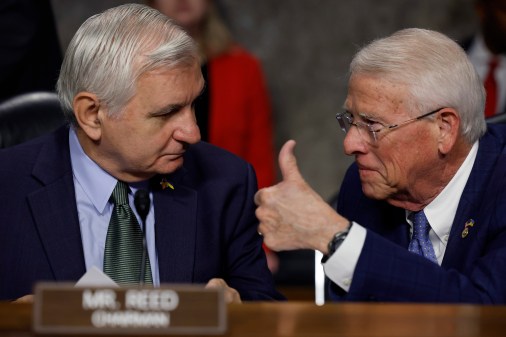Compromise NDAA includes AI bug bounty program, prize competition for detection and watermarking

The compromise draft of the annual defense policy bill includes a mandate for the Pentagon to set up a bug bounty program and a prize competition to mitigate risks posed by artificial intelligence — a reflection of lawmakers’ concerns about potential military vulnerabilities.
The Department of Defense has used bug bounty programs to find cyber weaknesses by incentivizing white-hat hackers to hunt for them. Now, lawmakers want a similar concept to be applied to AI models.
“Not later than 180 days after the date of the enactment of this Act and subject to the availability of appropriations, the Chief Digital and Artificial Intelligence Officer of the Department of Defense shall develop a bug bounty program for foundational artificial intelligence models being integrated into the missions and operations of the Department of Defense,” states the conference report on the fiscal 2024 National Defense Authorization Act that was released this week.
For the bill, lawmakers define a foundational AI model as “an adaptive generative model that is trained on a broad set of unlabeled data sets that may be used for different tasks with minimal fine-tuning.”
The CDAO would be able to collaborate with leaders of other federal departments and agencies that have cybersecurity and AI expertise on the effort.
No later than one year after the enactment of the legislation, the head of that office would be required to brief congressional committees on the development and implementation of the program and long-term plans for these types of initiatives.
An amendment to the Senate’s version of the NDAA included a provision for an AI bug bounty program, but the House version did not. The mandate for such a program made it into the compromise version.
The CDAO is already exploring bounty concepts for its missions. In July, it issued a call to industry to set up and administer a “bias bounty” program to tackle bias in artificial intelligence systems.
Meanwhile, the Pentagon is exploring use cases for generative artificial intelligence through Task Force Lima and other efforts. However, there are also concerns that adversaries could use generative AI to harm the United States.
The Senate version of the NDAA included an amendment that would require the Defense Department to create and execute a prize competition to evaluate technology for the detection and watermarking of generative AI. The House version did not include such a provision, but the compromise version does.
“Not later than 270 days after the date of the enactment of this Act, under the authority of section 4025 of title 10, United States Code, the Secretary of Defense shall establish a prize competition designed to evaluate technology (including applications, tools, and models) for generative artificial intelligence detection and generative artificial intelligence watermarking,” the NDAA conference report states.
The objective would be to facilitate the research, development, testing and evaluation of these types of technologies to support the secretaries of the military departments and combatant commanders “in warfighting requirements,” as well as transitioning such technologies from prototyping to production.
For the bill, lawmakers define generative AI detection as “the positive identification of the use of generative artificial intelligence in the generation of” digital content. Generative AI watermarking is defined as “embedding within such content data conveying attribution of the generation of such content to generative artificial intelligence.”
Private sector entities, defense contractors, academia, federally funded R&D centers, and federal departments and agencies would be eligible to participate in the prize competition, which would be administered by the undersecretary of defense for research and engineering.
Congress hasn’t voted yet on the compromise NDAA.






